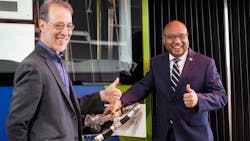The future of cleaner air is now as TriMet buses run on cleaner-burning renewable diesel
As of Dec. 2, 2021, all TriMet buses running on routes throughout the tri-county Portland metro area are now powered by renewable diesel.
TriMet is using a blend of 99 percent renewable diesel and one percent petroleum. The change in fuels will reduce the carbon dioxide equivalent emissions coming from an individual bus by nearly 99 percent. When factoring in the upstream emissions of making and delivering the R99 to TriMet’s facilities, the move to R99 will lower the greenhouse gas emissions from TriMet’s fixed-route bus fleet by about 61 percent compared to the biodiesel blend it had been using.
“Whether riding on a TriMet bus, driving behind it or walking or biking nearby, you’ll notice a big difference with our buses now running on cleaner-burning renewable diesel,” said TriMet General Manager Sam Desue Jr. “As Oregon’s largest consumer of diesel before today, we’re not only lowering TriMet’s greenhouse gas emissions, we’re leading the state’s transportation industry toward a cleaner air future right now.”
TriMet’s switch to a renewable diesel blend is coupled with a switch to renewable electricity in June 2021. The combined efforts have reduced carbon dioxide equivalent emissions by more than half—63 percent—in six months’ time. TriMet expects to avoid 149 million pounds of greenhouse gas emissions every year. That’s the equivalent of taking 14,693 cars off the road.
“For Oregon to step up, be a model and convince the rest of the nation to join the fight against climate change, we need to get serious about reducing our transportation emissions, the largest source of emissions in this state,” said Oregon State Sen. Michael Dembrow. “To do that, we need more people to be using transit, and we need to make sure that the energy used to run those buses and trains are coming from renewable sources. By switching to renewable electricity and renewable, green diesel, TriMet is making a huge difference in moving us forward. I’m so proud of this decision.”
The shift to renewable diesel
On Dec. 1, Carson trucks pulled into TriMet’s three bus operating facilities, delivering Neste MY Renewable Diesel™, a low-carbon biofuel. The renewable diesel is chemically identical to petroleum, but it contains nearly no fossil carbon and performs better in cold air. It is made from 100 percent renewable and sustainable resources like natural fats, vegetable oils and grease.
According to Neste, “unlike fossil diesel, Neste MY Renewable Diesel contains no aromatics or impurities.” Because of this, and based on a 2019 pilot of renewable diesel, TriMet expects to reduce maintenance costs by an estimated $100,000 a year.
TriMet celebrated the shift to a cleaner burning fuel with Desue Jr. and Sen. Dembrow—a proponent of reducing carbon emissions in the transportation industry—fueling a bus with the R99 at TriMet’s Powell Operations Facility in southeast Portland. The bus, a 60-foot articulated bus, will serve riders along the Division Street corridor between Portland and Gresham next fall once the Division Transit Project wraps up.
Desue and Sen. Dembrow were joined by Metro Council President Lynn Peterson, Multnomah County Commissioner Jessica Vega-Pederson, Portland General Electric President and CEO Maria Pope and Climate Solutions’ Oregon Director Meredith Connolly.
“Cutting pollution, creating livable communities and improving safety – all of these things are critical to Metro’s mission of supporting transit in greater Portland,” said Peterson. “By switching to R99 diesel and electric buses, TriMet is making a commitment to reducing emissions and improving air quality in our transit corridors, supporting livability and health.”
“Congratulations to TriMet on a major milestone in their journey to a clean energy future,” added Portland General Electric President and CEO Maria Pope. “Their announcement today to switch to renewable fuel is a significant step forward. From the first electric bus route in Oregon to the first overhead gantry charger, we are proud to partner with them on their journey and power their facilities and electric buses with 100 percent renewable energy.”
On the road to a zero-emissions bus fleet
While TriMet’s switch to renewable diesel is the latest effort to reduce its carbon footprint, it won’t be the last. TriMet says it is committed to move to a zero-emissions bus fleet by 2040.
TriMet launched the first five of its short-range electric buses back in 2019. In November, it began testing five long-range electric buses, which are meant to run all day and charge at night. TriMet is also testing three 40-foot buses and an articulated 60-foot bus that were converted from diesel to all electric buses.
More electric buses are on the way! Our plan is to add 24 more of these zero-emissions bus in fiscal year 2024 that begins July 2023.
Altogether, these and other efforts at TriMet are working toward the goal of a cleaner, healthier future starting today.




